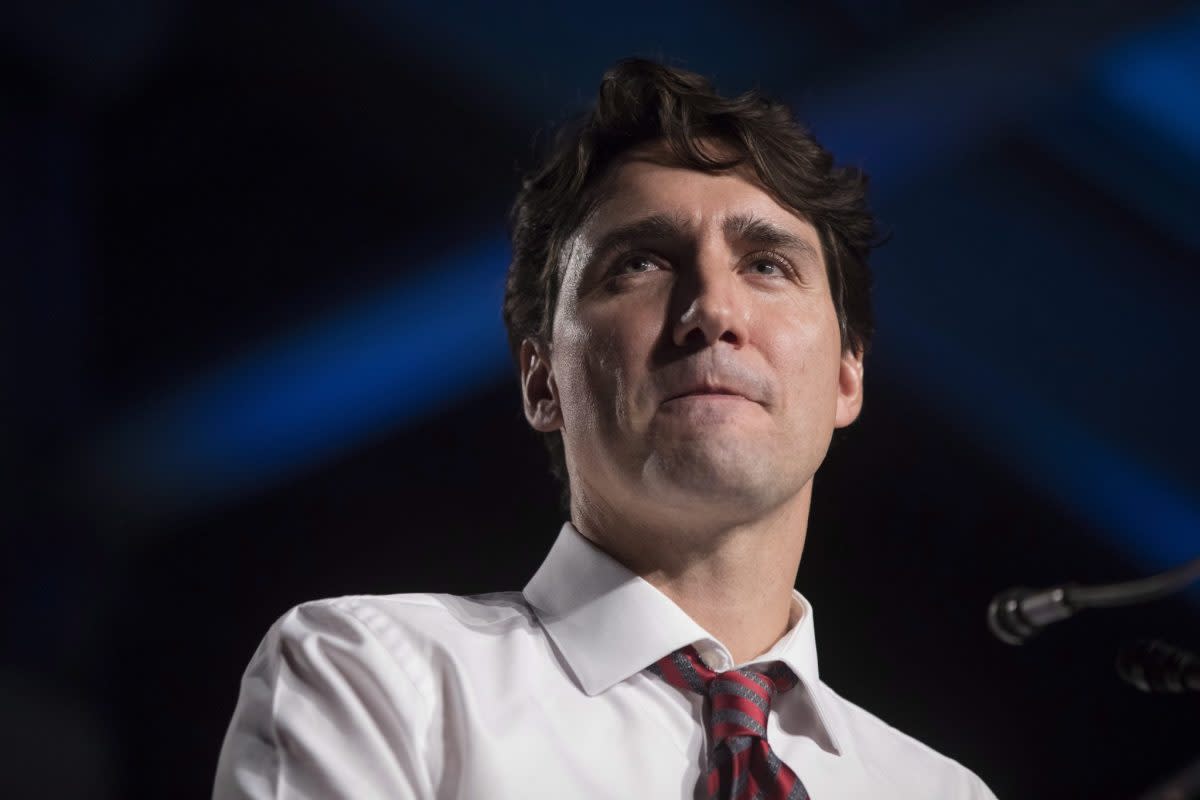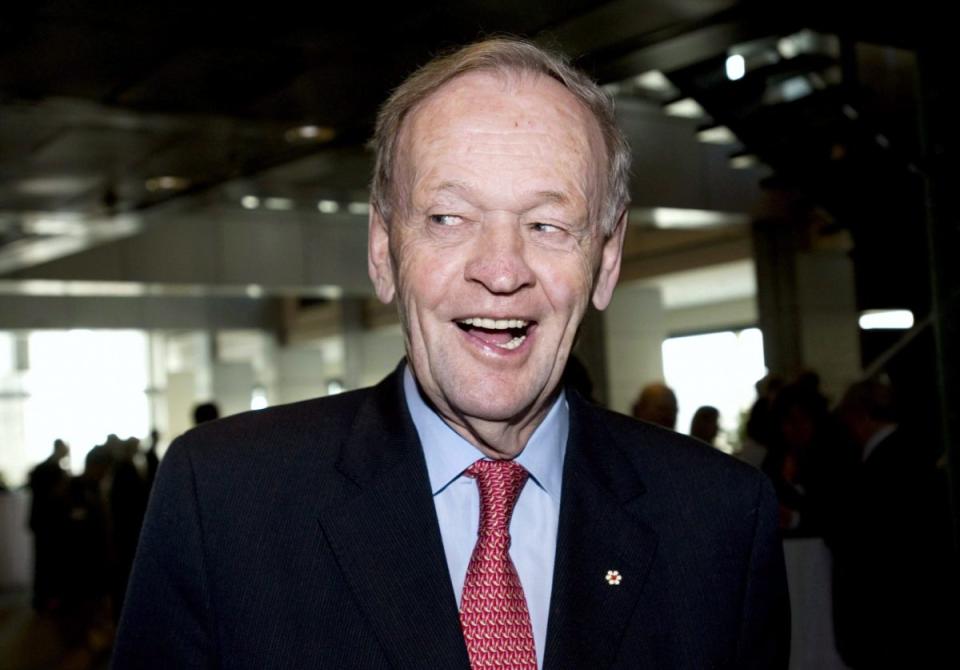After battling back from sponsorship scandal days, new fundraisers 'can't help but hurt' the Liberal brand, say experts

Almost six years ago, as a minority Conservative government took up arms against federal taxpayer subsidies of political parties in its march toward the next election, the deputy Liberal leader at the time was busy raising the alarm.
The subsidies, which gave parties around $2 per vote if they met certain vote thresholds, were crucial for keeping the playing field level, Ralph Goodale told the CBC in 2011.
Then-prime minister Stephen Harper’s ultimate goal, Goodale said, was to “essentially, let the big and the wealthy and the most privileged run the show.”
Goodale would know about the fight against moneyed interests: As finance minister in 2005, he was named in an RCMP criminal probe concerning financial leaks, announced smack in the middle of that year’s election campaign, and just weeks after the public saw a preliminary report on the sponsorship program.
Goodale was cleared in the probe, but a complaints commission report years later found the move likely helped sink Liberal fortunes and usher in the Harper era.
Now, Goodale oversees the RCMP as public safety minister for the Trudeau Liberals, the team that finally defeated Harper after almost a decade in power.
And as sure as political fortunes in Ottawa keep revolving, Canada’s government is once again facing another political financing fracas, one that’s dragging both the sponsorship scandal and the per-vote subsidy controversy back into the headlines.

It is the Liberals who now stand accused of letting the big, wealthy, privileged interests run the show, although they loudly deny any ethical breaches.
The concern centres around so-called “cash-for-access” fundraisers. In several instances — over 100 events, according to Vice News — donors pay up to the legal limit of just over $1,500 to attend exclusive events with Liberal ministers.
For example, Bill Blair, the parliamentary secretary to the justice minister and the government’s point man on marijuana legalization, showed up at a $150-per-ticket Liberal Party fundraiser in April at a Toronto law office with clients in the business, and attended by a marijuana lobbying group, according to the Globe and Mail. The Liberals have denied any ethical breaches but have also offered to return the money to one association.
In another example, Finance Minister Bill Morneau attended a $1,500-per-ticket fundraiser in Halifax in October, and another $500-per-ticket event in Toronto, according to CTV News. Selling tickets for the event, CTV reported, was the chairman of a drug manufacturer that has lobbied Morneau’s office. Morneau, however, says the fundraising tickets don’t give preferential treatment and compared them to town halls.
Prime Minister Justin Trudeau himself has been accused of participating in cash-for-access, at a $1,525-per-person fundraiser with Chinese business leaders in May. That event has led to questions about connections with a canola oil businessman, according to the Tyee, and another financier setting up a bank, according to the Toronto Star. The government says those subjects and the fundraising are unrelated.
What’s more, the Liberals appear to be failing their own ethics guidelines, which state that, when fundraising and dealing with lobbyists, “ministers and Parliamentary secretaries must avoid conflict of interest, the appearance of conflict of interest and situations that have the potential to involve conflicts of interest.”
The party says it’s following all the rules. “It is important that Canadians be reassured that we have, at the federal level, some of the strongest rules around election financing, not just in the country, but indeed around the world,” Trudeau told the House of Commons on Tuesday in response to questions about the marijuana-related fundraiser.
Not everyone is fully convinced, however, that simply having rules in place is enough.
“These kinds of fundraisers obviously raise questions about the relationship of money to democracy,” said Dennis M. Pilon, a political science professor at York University studying elections and democratic reform.
“Any definition of democracy has embedded within it a notion of equality, that we’re all citizens, and that citizens rich or poor should be able to influence the political process … if money gets you to the table with the prime minister, then do some people have more democracy?”
Pilon said the fundraisers raise the issue of how voters often are less engaged in the political process outside of elections than paid lobbyists, who are there trying to convince government officials day in, day out.
“The question is, what kind of conversations are going on at the table? What kind of promises are being made to the people who show up and give this money to the party?”
He argued the per-vote subsidy, which expired in 2015 after the Conservatives phased it out, was the most equal and democratic approach to funding political parties. The parties got money based on their level of voter support, rather than their expertise at wrangling donors.
Public funding and big-time donors aren’t the only answers, said Pilon. The NDP and the Conservatives have both raised funds from many small donations. But the Liberals tend to capture less hardcore devotees than those attracted to the parties on the left and the right, he argued.
Not all voters can afford to pay hundreds or even thousands of dollars to get their voice heard, said Geneviève Tellier, a social sciences professor at the University of Ottawa who studies public finances of federal and provincial governments.
“You need to have a big income before the amount is marginal in your own budget. It’s providing access to those in power,” she said.
She noted that the Ontario legislature passed a bill Thursday banning similar activity. Like the federal Liberals, the Ontario Liberal Party has faced criticism over its ministers attending private events with big price tags and stakeholders roaming the venue, the Canadian Press reports.
The Ontario bill bans corporate and union donations and lowers donor limits, as well as bans members of the provincial legislature, candidates, party leaders and others from attending fundraisers that charge more than recovery costs to host events.
The public expects public officials “to be more ethical in their behaviour, and more accountable to the public. There are things now that we don’t accept as much as we used to accept,” she said.
The fundraisers “can’t help but hurt the brand,” said Pilon. The high level of Liberal support in the 2015 election, he said, was based at least partly on a mass of non-Liberal voters who went for Trudeau as a way to stop Harper.
Those voters might drift away by 2019 if they are turned off by more examples of big money in politics, he said.



